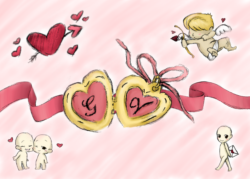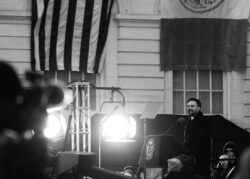He’s watching you as you walk to Lau. He’s at your Thursday evening pregame. He’s balling out in the NBA. He’s rocking the red carpet in Hollywood. He’s in the Super Bowl (albeit in a Best Buy commercial). He’s even in a body bag on CSI: Crime Scene Investigation. Though only 16 years old, Justin Bieber has gone from lowly Ontario preteen to international superstar in the blink of an eye.
Bieber has become a cultural phenomenon, and he has the accolades to prove it. His debut album, My World 2.0, has gone double platinum in the U.S., Australia, and his native Canada, with the single “Baby” leading the way, achieving millions of downloads worldwide and topping the charts across North America and Europe. The foyer to his posh home in the suburbs of Atlanta is already graced by an assortment of awards. His face has been featured on a variety of memorabilia, from action figures to Christmas stockings. Naturally, his celebrity has not gone unnoticed by the tabloids—remember that cheesy smile on the cover of People last April?
But not all the news has been good, particularly in the ever critical realm of cyberspace. In the same month that Bieber’s “Baby” surpassed Lady Gaga’s “Bad Romance” to become the most viewed music video ever on YouTube, the very same video broke the record for the most disliked video in the site’s history. While his Twitter followers accounted for three percent of all Twitter traffic in September 2010, Bieber was in the midst of shaking off an online hate campaign aimed at sending the adolescent to the communist nation of North Korea during his next world tour and a widespread viral rumor that Bieber suffered from syphilis (Bieber is actually a strong advocate for chastity and supports abstinence education).
Bieber’s polarizing public figure has bred obsessive fans and virulent critics, whose opinions on the teenager mirror the reception of modern pop music as a whole. Supporters admire Bieber’s—and by extension pop music’s—adoption of electronic, hip-hop, and rock influences, favoring above all else whatever’s catchy at the moment. Critics complain about the complete void of musical talent in the Top-40 and yearn for a time when music was more organic and unprocessed. While I have no qualms with anyone’s personal preferences, I do have an issue with those maligners who dismiss pop artists and their music on the pretense that their efforts require no “talent.”
Take Bieber. His mother, Patricia Mallette, gave birth to Bieber at the age of 18 and raised him as a single-parent in low-income housing. In spite of his limited financial resources, he taught himself how to play piano, guitar, drums, and trumpet. And though not professionally trained, Bieber decided to participate in Stratford Idol, a hometown talent competition where he wowed audiences with his stripped-down rendition of “So Sick” by Ne-Yo. Thanks to the wonders of social media, Bieber’s name and music spread like wildfire across the internet and into the hands of talent manager Scooter Braun. At the age of 13, Bieber decided to make music his career, and, after convincing his weary mother, flew down to Florida to begin recording an album. In Atlanta, his talent caught the attention of multi-platinum artists Usher and Justin Timberlake, who fought over signing him to their respective labels. In the end, Usher won and Bieber signed with Island Records. The rest, as they say, is history.
Before he had the fancy, studio-manufactured tracks or the entourage of personal stylists and assistants, Bieber had to rely on vocal talent and internet savvy alone to gain attention and build a brand. It’s easy to look at Bieber’s pristine haircut and his tight, red designer jeans and see a spoiled kid whose good-looks and charm propelled him to the top of charts already inundated with artists who sold their musical souls to the record company devils. However, Bieber’s rise demonstrates quite the opposite: a motivated and driven teen who surpassed all of society’s expectations thanks to hard-work, dedication, and, undeniably, talent.
Granted, not all pop artists are truly talented (Ever heard “Tardy for the Party” by Real Housewives of Atlanta star Kim Zolciak?). Some are spoiled, some are undeserving, and, yes, some are talentless, but this applies to a small number of pop stars. When we stop viewing Bieber, and pop artists in general, as cogs in an industry machine, we can judge him on his true merits, which history, record sales, chart performances, and even the majority of critics agree are worthy.
So even if Justin Bieber’s music doesn’t make “U Smile,” or if you’ve only listened to his music “One Time,” his past and accomplishments merit him being “Somebody to Love.” And if you think Bieber won’t ever be someone you idolize or admire, “Never Say Never,” “Baby.”




